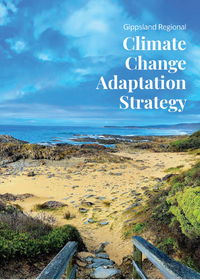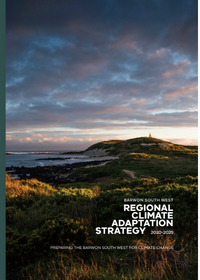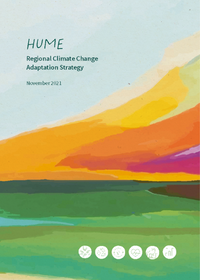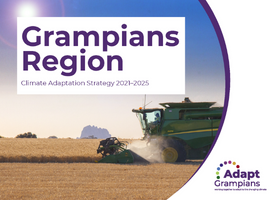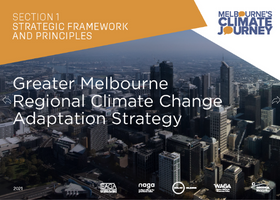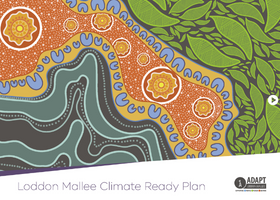Climate leadership on the ground
The best outcomes for our climate and the greatest opportunities for the people of Victoria come from working together on climate action. Many local councils, businesses, households and communities across Victoria are already playing an important role in our collective response to climate change.
We are committed to supporting this ambition and building our climate change actions together. This includes:
- supporting local adaptation
- helping businesses to adapt and thrive in a low-emissions future
- supporting households to increase their energy efficiency
- assisting communities to switch to renewables and adapt to the impacts of climate change.
Regional Climate Change Adaptation Strategies
Regional Climate Change Adaptation Strategies (RASs) are 5-year practical strategies developed by the community to address the unique challenges and opportunities that climate change brings to Victoria’s regions and guide locally relevant practical action.
Themes in the strategies include:
- preparing for and recovering from emergencies
- caring for the natural environment
- improving health and wellbeing
- strengthening the economy and workforce
- improving resilience of our built environment
- embracing renewable energy.
Check out your RAS for more information:
The RASs were developed over 4 years through a place-based, community-owned and led process supported by the Victorian Government. More than 8,000 Victorians were involved. The strategies are the centrepiece of the $9.32 million Supporting Our Regions to Adapt program funded by the Sustainability Fund.
The program supports collaboration within regional communities to strengthen resilience to climate change by building adaptive capacity and delivering place-based, locally relevant adaptation action.
Funding for 2021-22 priority projects
In addition to funding the RASs, the Supporting Our Regions to Adapt program also provides $1.5million for the initial implementation of priority projects.
For a list of projects by region, please refer to the Regional Adaptation Projects selected by Regional Stakeholder Working Groups (PDF, 1003.2 KB).
Community Climate Change Adaptation (3CA) Grants Program
The Department of Energy, Environment and Climate Action (DEECA) delivered the $1 million Community Climate Change Adaptation (3CA) Grants Program to build resilience to climate change impacts through community-driven adaptation activities. As part of this one-off funding program, grants were awarded to 17 community-led adaptation projects (DOCX, 259.7 KB) that addressed identified gaps and priorities in Victoria’s regions.
Some of the stories of community-led adaptation that the 3CA Grants have supported are generously shared by project leaders and participants on the Climate Change Adaptation Stories page.
Regional adaptation resources
This feedback is a summary of submissions made on the draft Grampians Region Climate Adaptation Strategy following public exhibition on Engage Victoria. The draft strategy was released for public comment on the 7 April 2021 with submissions closing on the 23 May 2021.
This report summarises the comments made and issues raised in public submissions. The feedback report also explains how the Grampians Region Climate Adaptation Strategy was amended in response to each public submission.
In 2018, the Victorian Government spoke with community members, businesses, researchers and government agencies across the state. These snapshots will soon be replaced by local-led regional climate change adaptation strategies.
Read about the climate impacts, actions, gaps and priorities for your area, based on those conversations.
- Barwon South West climate change adaptation snapshot report (PDF, 2.5 MB)
- Gippsland climate change adaptation snapshot report (PDF, 2.2 MB)
- Grampians climate change adaptation snapshot report (PDF, 2.1 MB)
- Greater Melbourne climate change adaptation snapshot report (PDF, 2.3 MB)
- Hume climate change adaptation snapshot report (PDF, 1.9 MB)
- Loddon Mallee climate change adaptation snapshot report (GIF, 39.5 KB)
Place-based adaptation guidance notes – a best practice approach to adaptation planning in Victoria’s regions
- Place-based Climate Change Adaptation Guidance Notes: Overview (PDF, 918.0 KB)
- Guidance Note 1: Place-based Adaptation Concepts and Approaches (PDF, 684.1 KB)
- Guidance Note 2: Establishing a Learning Framework (PDF, 341.4 KB)
- Guidance Note 3: Developing the Regional Adaptation Strategy (RAS) vision, goals and change narrative (PDF, 987.5 KB)
- Guidance Note 4: Understanding the Region (PDF, 1.1 MB)
- Guidance Note 5: Exploring Multiple Futures (PDF, 1.8 MB)
Regional adaptation policy briefs – understanding the drivers and barriers for place-based adaptation
- Policy Brief 1 - Barriers to the implementation of climate change adaptation plans and action (PDF, 257.3 KB)
- Policy Brief 2 - Determinants of adaptive capacity for climate change adaptation (PDF, 205.2 KB)
- Policy Brief 3 - Social and cultural barriers to the implementation of climate change adaptation plans and action (PDF, 244.9 KB)
Local government
Local governments play a critical role helping their communities to reduce emissions and adapt to climate change. Local governments are often the first to respond to localised climate change impacts and their strong connections to the community and local knowledge mean they are often best placed to recognise the need for adaptation at a local scale.
Many of Victoria’s local governments have shown leadership by setting their own emissions reduction pledges and adaptation plans. To acknowledge these actions and as a platform for local governments and the state government to work together towards a net-zero future, councils are submitting voluntary council pledges under the Climate Action Act 2017.
The following guidance does not reflect subsequent updates to the Planning and Environment Act 1987.
The Climate Change and Energy Legislative Amendment (Renewable Energy & Storage Targets) Act 2024 has made two major amendments to the Planning and Environment Act 1987. These are:
- A new rule for planning authorities preparing a planning scheme or planning scheme amendment. Planning authorities must now consider climate change including climate hazards and emissions reductions targets. The Minister for Planning may publish Ministerial Directions for this new rule. Planning authorities must follow these Directions when fulfilling the new rule.
- A new planning framework objective. The objective includes the consideration of climate change policies and obligations when planning for the use and development of land.
Across April to June 2021, DEECA delivered 9 live, online, and interactive training sessions for Victorian local government councillors and executives on climate change risk and adaptation entitled Your Council and Climate Change: Understanding the risks and learning to adapt.
The training slides, resources and a recorded training session are included here for your reference. Note that in training, the material presented was the slide pack and notes with the resources and brochures provided as hand-outs.
- Slide pack and notes from councillor and executive climate change training session (PDF, 3.5 MB)
- Video of councillor and executive climate change local government training session
Training resources and brochures from council and executive climate change training session
- Business risks and responses to climate change (PDF, 46.7 KB)
- Local government roles and responsibilities summary (PDF, 32.8 KB)
- Checklist local government roles and responsibilities (PDF, 49.4 KB)
- Climate change duty of care and due diligence (PDF, 2.3 MB)
- Climate change impacts on councils (PDF, 149.5 KB)
- Embedding climate change across council - editable (PDF, 45.9 KB)
- Local government case studies (PDF, 2.0 MB)
- Understanding climate change risks - postcards (PDF, 2.2 MB)
Detailed climate change themes (slides and notes) were used to develop the councillor and executive climate change local government training sessions
We also have 7 detailed slide packs on individual climate themes, from which the training session was created. These materials provide more information than live training. These materials are important resources for those who wish to build their climate change understanding and assist colleagues in doing the same.
- Introduction - your council and climate change - understanding the risks and learning to adapt (PDF, 5.6 MB)
- Climate Change - science and impacts (PDF, 6.5 MB)
- Climate Change impacts on council (PDF, 3.8 MB)
- Understanding climate risk (PDF, 2.2 MB)
- Local government roles and responsibilities (PDF, 3.0 MB)
- Business and community responses (PDF, 4.7 MB)
- Climate Change action in local government (PDF, 6.4 MB)
- Local Government Roles and Responsibilities for Adaptation under Victorian Legislation: Guidance Brief (PDF, 1.3 MB)
- Climate Change Data and Information for Local Government Factsheet (PDF, 801.4 KB)
- Climate Change Data and Information for Local Government Factsheet: accessible (DOCX, 4.8 MB)
- Climate Change Risks to Local Government (PDF, 450.3 KB)
- State-Local Government Climate Change Projects 2010-2020
The Australian Standard 5334-2013, Climate change adaptation for settlements and infrastructure: A risk-based approach provides principles and generic guidelines on the management of the risks that settlements and infrastructure face from the impacts of climate change.
This Standard is relevant to individuals, organisations, state and local governments concerned with all phases in the lifecycle of settlements or infrastructure that will be affected by climate change.
Victorian Government Response to the Inquiry into Tackling Climate Change in Victorian Communities
The Victorian Government has released its response to the Inquiry into Tackling Climate Change in Victorian Communities. The response can be accessed here:
- Victorian Government response to the Inquiry into Tackling Climate Change in Victorian Communities (PDF, 8.7 MB)
- Victorian Government response to the Inquiry into Tackling Climate Change in Victorian Communities - accessible (DOCX, 147.6 KB)
The government response demonstrates strong action on climate change, including support being provided to communities, businesses, regional Victorians and local government.
The Inquiry conducted by the Legislative Assembly’s Environment and Planning Committee reflects the need for united action on climate change. The Inquiry was informed by 162 submissions from individuals, councils, community groups, government departments and agencies and greenhouse alliances. The Committee held 15 days of public hearings across regional and metropolitan Victoria between September 2019 and March 2020.
You can find out more about the Inquiry into Tackling Climate Change in Victorian Communities inquiry and access.
Communities, businesses and households
Across the state, many Victorians are taking action to reduce emissions within their households and local communities, through schools and sporting clubs, and in small and medium businesses and major industries of every type.
The government is committed to working with Victorian businesses, households and communities to support their ambitions and build our actions on climate change together.
There are many resources available to help businesses, households and communities get involved in our collective response to climate change.
- Victorian Energy Saver – information and tools to save energy and money on bills
- Solar energy and rebates – information from Solar Victoria
- Better Health Channel – information on climate change and health
- Sustainability Victoria resources – information on energy efficiency and emissions reductions
- Victorian Energy Upgrades program – access to discounted energy-saving products and services
- Circular Economy Business Innovation Centre – accelerating a circular and climate-resilient economy
- Community Power Hubs – support for community energy projects
- ResourceSmart Schools program – support for schools to integrate sustainability into the curriculum
- Traditional Owners Renewable Energy Program – project information
- Community energy – projects and guides
Contact us
To contact us email climate.change@deeca.vic.gov.au
Page last updated: 29/05/25
